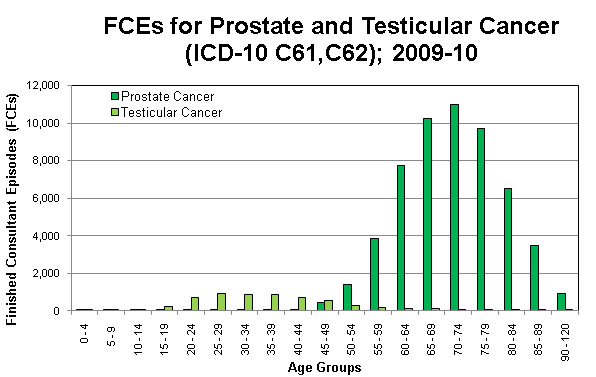IN THIS SITE...

- NHS Choices: Prostate cancer
- NHS Choices: Testicular cancer
HES on... Male specific cancer
The main male specific cancers are prostate cancer and testicular cancer. Information on what can be found on these cancers in HES in the year 2009-10 can be found below.
What is Prostate Cancer?
The prostate is a small gland in the pelvis that is found only in men. About the size of a walnut, it is located between the penis and the bladder. It surrounds the urethra, the tube that carries urine from the bladder to the penis.
Prostate cancer normally causes no symptoms until the cancer has grown large enough to put pressure on the urethra. This normally results in problems associated with urination.
Who does it affect?
Each year in the UK about 36,000 men are diagnosed with prostate cancer. It accounts for 25% of all newly diagnosed cases of cancer in men. The chances of developing prostate cancer increase as you get older. Most cases develop in men aged 70 or older.
What is Testicular Cancer?
The testicles are the two oval-shaped male sex organs that sit inside the scrotum on either side of the penis. The testicles are an important part of the male reproductive system because they produce sperm and the hormone testosterone, which plays a major role in male sexual development. The most common symptom of testicular cancer is a painless lump or swelling in the testicles.
Who does it affect?
Testicular cancer is relatively uncommon, accounting for just 1% of all cancers that occur in men. Testicular cancer is unusual compared to other types of cancers because it tends to affect younger men who are 20 to 55 years of age. As a result, although relatively uncommon overall, testicular cancer is the most common type of cancer to affect young men (20 to 35 years of age).
 |
HES facts and figures
In 2009-10 HES data for prostate cancer (ICD-10 C61) shows the following:
- there were 55,586 finished consultant episodes (FCEs)
- 87% (44,338) of hospital admissions were elective admissions
- it accounted for 141,389 FCE bed days
- the average (mean) length of stay was 6.7 days
- 20% (11,287) of FCEs had a main operation or procedure of M70 - Other Operations on outlet of Male Bladder.
In 2009-10 HES data for testicular cancer (ICD-10 C62) shows the following:
- there were 5,890 finished consultant episodes (FCEs)
- 92% (5,823) of hospital admissions were elective admissions
- it accounted for 11,453 FCE bed days
- the average (mean) length of stay was 6.7 days
- the average (mean) length of stay was 3.4 days
- 38% (2,264) of FCEs had a main operation or procedure of X70 - Procurement of drugs for chemotherapy for neoplasm in Bands 1-5.
More information on this topic is available from NHS Choices through the following:
- protate cancer
- testicular cancer

